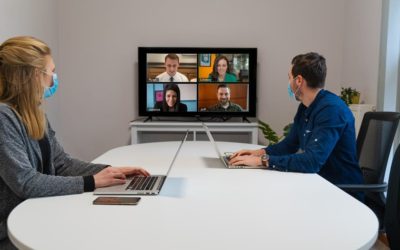Writing to Enhance Learning; a Key Skill for Special Librarians
Miriam Kahn, MLS, PhD
Writing well and fluently is an essential skill for all information professionals. As you become more comfortable with this form of communication, writing embeds into your personal knowledge domain the things you learn and skills you develop. By writing about what you learn, you expand your ability to articulate concepts and techniques to colleagues and researchers.
Writing actively and regularly is an adjunct to the other essential skills I’ve been writing about, Active Listening and Active Reading. Active Writing is another tool in your toolbox. Combining all three skills—listening, reading, and writing—builds communication strengths and improves your ability to share techniques with others.
A Writing Regimen
There are many ways to gain fluency in writing but the best way is to make it a life-long habit. Yes, you need to add writing to your “bag of tricks.” Throughout history, thinkers, philosophers, scientists, politicians, writers (and scribblers), and individuals have written on what they are passionate about. They kept private diaries and journals, writing about their personal thoughts, about events and journeys. Many kept diaries that were public for others to read. Each developed the pattern, the habit, of writing regularly, every day.
You might be journaling already; it’s a popular trend these days. You might be blogging on social media. If so, you are already in the habit of writing. Let’s shift that habit into your work sphere and build your capacity to learn and share new knowledge and skills with others.
To create a daily writing regimen at and for work, write about:
- Something every day.
- A new database, reference resource, product, or service.
- A research skill, a trend, or even a news event within your industry.
- An article that explores your industry or discipline.
Begin each day by writing something short. It doesn’t have to be long or complex. Write 500 words, that’s one page. Write 200 words that encapsulate a skill or technique. Write on paper or type into a computer (the former is better). Jot down a technique you recently mastered and expand upon it.
Writing and learning
Information professionals are always learning something new. Now it’s time to share what we dig into every day. When you write about what you learn, you embed that skill into your own knowledge domain, into your own bag of tricks. While memorization is wonderful, learning is better. You know you’ve learned skill or concept when you turn around and teach that very same thing. Writing is similar to teaching. Rather than explaining out loud, the instruction occurs through the written or typed word.
Just how do you write to learn? It’s easy: write about what you did; the database, the research, or the technique. Arrange the task in a logical, step-by-step manner. Describe how you ferreted out the information, and you’ll be doing two things: embedding that skill within yourself, and sharing with colleagues and researchers within your company or industry. This type of writing is described and defined as Technical Writing—that is, teaching or instructing rather than theorizing and describing.
Technical Writing as Adjunct to Learning
Technical writing by its very nature is didactic. It teaches someone else how to do something specific, like using a help feature, performing an advanced search, or sifting through information. Technical writing tends to be terse, written in declarative sentences, and contains minimal tangents or explanation. All the theory, the background information, is shunted into appendices or footnote references.
Technical writing is a natural component of writing to learn. It is writing that describes how to do something else. For example: using facets within a database or advanced search to narrow a search can be tricky. Write down the steps for locating the facets, using those terms, and adding or eliminating controlled vocabulary to hone a search and identify requested information. As you write about using facets, you are learning to manipulate them.
Writing as a habit
The more you write, the more fluid your writing gets, the more it becomes a habit, and the more you realize you are learning new skills, new methods for communicating techniques, and gaining knowledge.
Build writing into your daily routine by scheduling the time. Write for 15 minutes, for 10 minutes. However long you write for, make it a regular, uninterrupted time.
- Write every day. Find a time that’s quiet and uninterrupted.
- Build writing into your daily routine.
- Write first thing in the morning. Write at lunch. Write at the end of each work day.
- Write a recap or reflection of your work day.
You can always add another writing session after you read an informative article or explore an online database.
Summing it up
Writing embeds skills and techniques. Writing is a method for learning something new.
If you write daily for a month or two, you build a habit and a crucial professional skill. An additional benefit is that you have lots to share with your colleagues and researchers. Writing regularly means you’ll have enough for an article, an extensive blog post, or even a monograph.
Writing daily increases your curiosity about the subject discipline. Feed that curiosity, dig into research, into a topic—then turn around and write about it.
If you want to learn more about this topic, check out William Zinsser’s Writing to Learn: How to Write – and Think – Clearly About Any Subject at All (originally published 1988) and his classic On Writing Well: An Informal Guide to Writing Nonfiction (originally published 1976).
My next blog post on skills for special librarians will be about self-renewal.
Miriam Kahn, MLS, PhD
Miriam B. Kahn, MLS, PhD provides education and consulting for libraries, archives, corporations, and individuals. See Miriam’s pieces for Lucidea covering library technology and skills for special librarians. Refresh your knowledge of Lucidea’s flagship ILS, SydneyEnterprise, here.
Similar Posts
Interview with Miriam Kahn
Interview with librarian and consultant Miriam Kahn with her perspective on trends in special librarianship and the future of the profession.
Unconferences Benefit Special Libraries, Archives, and Museums
Unconferences are the perfect platform for LAM professionals to share ideas, trends, and techniques in this world of social distancing/remote working
Exploiting Socially Distanced Opportunities in GLAM – Crowdsourcing
Special libraries, archives, and museums can boost engagement through crowdsourcing transcription, which is also the perfect volunteer opportunity.
Enhance and Add Access Points for “Socially Distanced” Library Users
Skills for special librarians working in a digital environment include learning how to expand their library’s or organization’s online presence.




Leave a Comment
Comments are reviewed and must adhere to our comments policy.
0 Comments